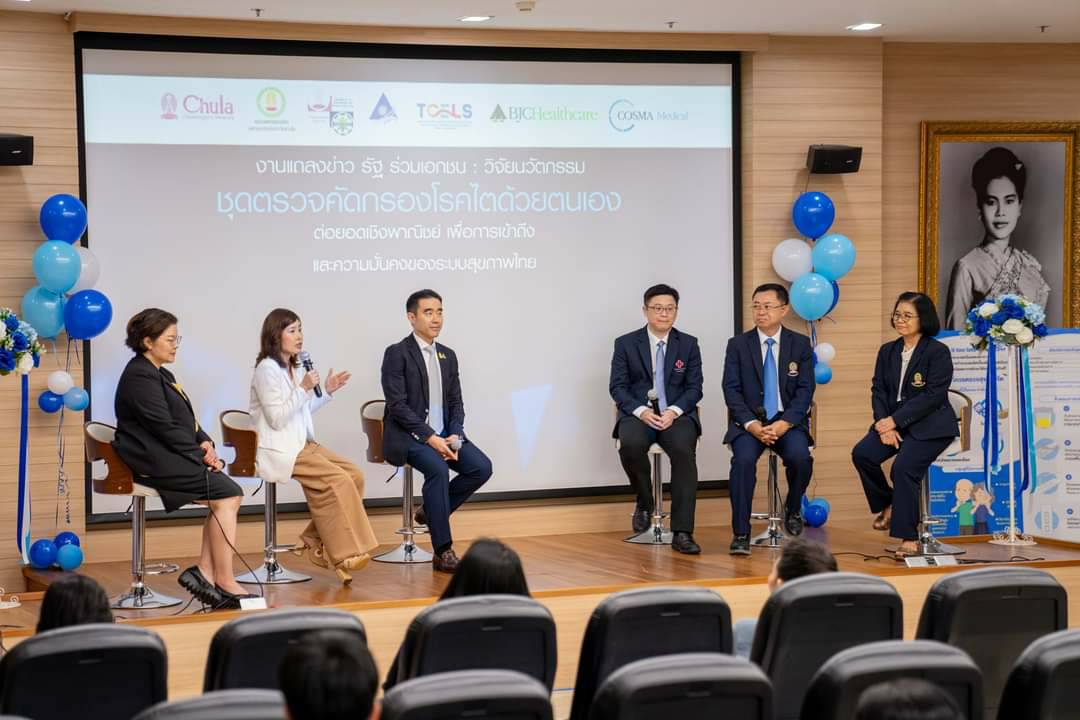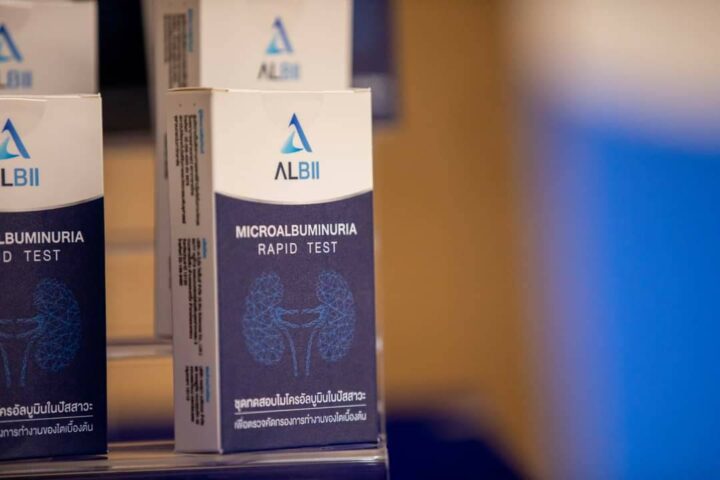Many executives of network partners from both the government and private sectors, as well as researchers, attended the launch of this innovation. The participants included Assoc. Prof. Dr. Chanchai Sittipunt, Dean of Faculty of Medicine, Chulalongkorn University, and Director of King Chulalongkorn Memorial Hospital, Prof. Dr. Nattachai Srisawat, Assistant Director of King Chulalongkorn Memorial Hospital and Director of the Excellence Center for Critical Care Nephrology of King Chulalongkorn Memorial Hospital, Assoc. Prof. Dr. Kittinan Komolpis, Deputy Director of the Institute of Biotechnology and Genetic Engineering, Prof. Dr. Sirirat Rengpipat, Director of the Qualified Diagnostic Development Center, Dr. Jurairat Phromjai, Research Manager at Health Systems Research Institute (HSRI), Ms. Narisa Mantangkun, Program Director, Advanced Medical Devices Technology & Medical Robotics, Thailand Center of Excellence for Life Sciences (TCELS), and Mr. Aswin Techajareonvikul, BJC BigC Group’s CEO.
Prof. Dr. Nattachai Srisawat, Assistant Director of King Chulalongkorn Memorial Hospital and Director of the Excellence Center for Critical Care Nephrology of King Chulalongkorn Memorial Hospital said that currently chronic kidney disease patients in Thailand make up as many as 17.5% of the population, accounting for approximately 11 million people (referring to data from the Thai SEEK project by (Prof. Dr. Atiporn Ingsathit and her team). Each year, the number of patients with chronic kidney disease, including patients receiving renal replacement therapy, increases, causing the declining quality of life of patients, increasing the workload of medical personnel, and raising public health expenditures. The current diagnosis of chronic kidney disease relies on serum creatinine values and microalbumin testing in urine, which requires patients to travel to the hospital, resulting in increased costs and wasted time. In addition, the various techniques for testing kidney function can sometimes lead to inaccuracy. The research team has therefore developed a Microalbuminuria Rapid Test to screen for early-stage chronic kidney disease. The innovation has been done in collaboration with a research and development network from multiple sectors. The efficacy of the test has been evaluated at King Chulalongkorn Memorial Hospital and expanded to larger-scale screening at the district level in Ban Phaeo District, Samut Sakhon Province.

The highlight of Microalbuminuria Rapid Test: Users can perform an initial self-assessment of their kidney function (self-care), which is easy to use and interpret. This benefits proactive policies where physicians and public health personnel can use it for early-stage screening of kidney disease patients. Early detection of kidney disease will result in patients becoming self-aware (self-literacy) and adjusting their lifestyle (lifestyle modification) to reduce the risk of developing chronic kidney disease in the future.

Assoc. Prof. Dr. Kittinan Komolpis, Deputy Director of the Institute of Biotechnology and Genetic Engineering, explained that the development of the microalbumin screening strip began in 2007 by Assoc. Prof. Dr. Kittinan in collaboration with Assoc. Prof. Dr. Wanida Laiwattanapaisan, Faculty of Allied Health Sciences, who was the thesis advisor for students conducting research at the institute. The research involved creating hybridomas that produce antibodies capable of specifically binding to albumin. These antibodies are a crucial component of the microalbumin screening strip. The ability to create and produce antibodies independently allows for further development and commercialization, rather than being limited to research. Subsequently, the research team selected suitable monoclonal antibodies and used them to develop a prototype albumin test strip. However, it had not been tested with urine samples from real patients until Prof. Dr. Nattachai put the test strip into actual use. This has led to a research project to evaluate the effectiveness of using the albumin screening strip with patient urine samples. The research results showed that the developed test strip provided results consistent with the current hospital testing methods.
Prof. Dr. Sirirat Rengpipat, Director of the Qualified Diagnostic Development Center, said Chulalongkorn University’s Qualified Diagnostic Development Center (QDD Center) is a certified medical device manufacturing facility (Registration No. Kor Tor. Sor Por. 182/2563) by the Food and Drug Administration, Ministry of Public Health. The center also has a Quality Management System (QMS) for medical device production that complies with the international standard ISO 13485:2016, certified by SGS, UKAS (Certificate TH23/00000017), demonstrating the expertise of the center’s personnel, efficient scientific equipment, and tools, and the capability to produce high-quality test strip kits ready for commercial distribution. This capability is seen in the Design and Development and Production of Lateral Flow Immunochromatographic Strip test, which employs the same technology as the “Microalbuminuria Rapid Test” being launched in this event. Hence, the center is well-equipped to serve as a third party to perform quality surveillance of products that integrate research results from various Chulalongkorn University teams, resulting in this effective test kit. The center will randomly sample test kits from stores while they are being sold to the general public to be examined for accuracy and precision. This is to ensure confidence in the test results, which can be used to more accurately analyze preliminary kidney health trends. This is an innovative approach to setting quality assessment standards for test kits sold in the market, providing rapid results and making manufacturers more aware of and attentive to maintaining consistent production process standards.
Dr. Jurairat Phromjai, Research Manager at Health Systems Research Institute (HSRI), explained that the high number of chronic kidney disease patients in Thailand, which accounts for 17.5% of the population and is continually increasing, along with data from the calculation of average expenses for renal replacement therapy using hemodialysis and peritoneal dialysis methods, approximately 378,095 baht per person per year, has placed a significant burden on the country’s healthcare expenditure. Therefore, in addition to developing innovative research in medical technology to meet quality standards, HSRI emphasizes the utilization of research results. This includes pushing for inclusion in the universal health coverage system and expanding commercial applications to support widespread use by various target groups. The Microalbuminuria Rapid Test, partially funded by HSRI, has shown clear results in reducing dependence on foreign technology, decreasing medical burdens and expenses. This demonstrates the opportunity to increase accessibility to reduce illness among the Thai population and enhance the stability of the healthcare system. In the future, if it can be included in the universal health coverage system, its utilization will be enhanced even further by being distributed to sub-district health promotion hospitals. As a result, early-stage screening of kidney disease patients will be possible, leading to overall health budget savings for the country.
Ms. Narisa Mantangkun, Program Director, Advanced Medical Devices Technology & Medical Robotics, Thailand Center of Excellence for Life Sciences (TCELS), stated that TCELS recognizes the importance of commercializing medical and health innovations for the benefits of society, enabling people to have equal access to medical and health services and innovations within the public health insurance system. So far, TCELS has collaborated with the National Health Security Office (NHSO), Food and Drug Administration, Ministry of Public Health, and related agencies, such as National Science, Research and Innovation Fund (NSRF), Thailand Science Research and Innovation (TSRI), and researchers in universities to promote and further medical and health research for Thai people. The goal is to push such research into commercial markets or into the national health insurance system, which provides free public health services to over 48 million Thai nationals across the country. From this collaboration, TCELS has supported and promoted Thai medical and health innovations to meet both national and international standards by registering Thai innovations and through monitoring and evaluation (M&E). Several Thai innovations have already been included in the benefit package of the universal health coverage system, such as colostomy bags for colorectal cancer patients, developed by researchers at Prince of Songkla University, and dental implants for elderly people with complete edentulism, researched and developed by the Dental Innovation Foundation under Royal Patronage, among others. The Microalbuminuria Rapid Test is another important Thai innovation that is currently being pushed into the universal health coverage system so that people can screen for the disease by themselves, thus reducing overcrowding in hospitals and increasing the ability to care for and treat the disease before the final stage. This will also help lessen the government’s health budget, increase the potential and number of Thai innovations, contributing to economic growth and sustainably supporting the advancement of Thailand’s medical and health industry. TCELS is ready to support entrepreneurs in the medical and health equipment industry to strengthen the country’s economy, enabling it to become one of the world’s leaders in comprehensive healthcare business services.
Mr. Aswin Techajareonvikul, BJC BigC Group’s CEO, expressed his appreciation to the Faculty of Medicine, Chulalongkorn University, for trusting BJC Healthcare to be a part of the distribution of this health product to the Thai population. BJC Healthcare is ready to cooperate with and support the government to further develop health innovations for Thai people in the future. BJC Healthcare has been offering products related to the care of patients with diabetes and kidney disease for nearly 30 years and has a deep understanding of the public health system and the care of patients with non-communicable diseases (NCDs).
The Microalbuminuria Rapid Test, or ALBII, developed by the Faculty of Medicine, will help everyone better care for patients, from prevention, treatment, and comprehensive healthcare. BJC Healthcare is well-equipped to market and distribute products nationwide, which will support the research and innovation work of educational institutions to be passed on to the public and benefit the health of Thai people. The distribution channels already available for the product include Pure Pharmacy in Big C and clinics for diabetes patients.
Furthermore, in order to make the product more accessible to patients, the Faculty of Medicine at Chulalongkorn University also supports sales through vending machines of the Center for Medical Innovation and Entrepreneurship (CMICe) and the ฬ Care store. Therefore, the ALBII will be an option for those who want to initially check their kidney function by themselves, conveniently, quickly, and saving time and expenses compared to availing of hospital services.

